Unit 1 My day 单元教案(6个课时)
文档属性
| 名称 | Unit 1 My day 单元教案(6个课时) | 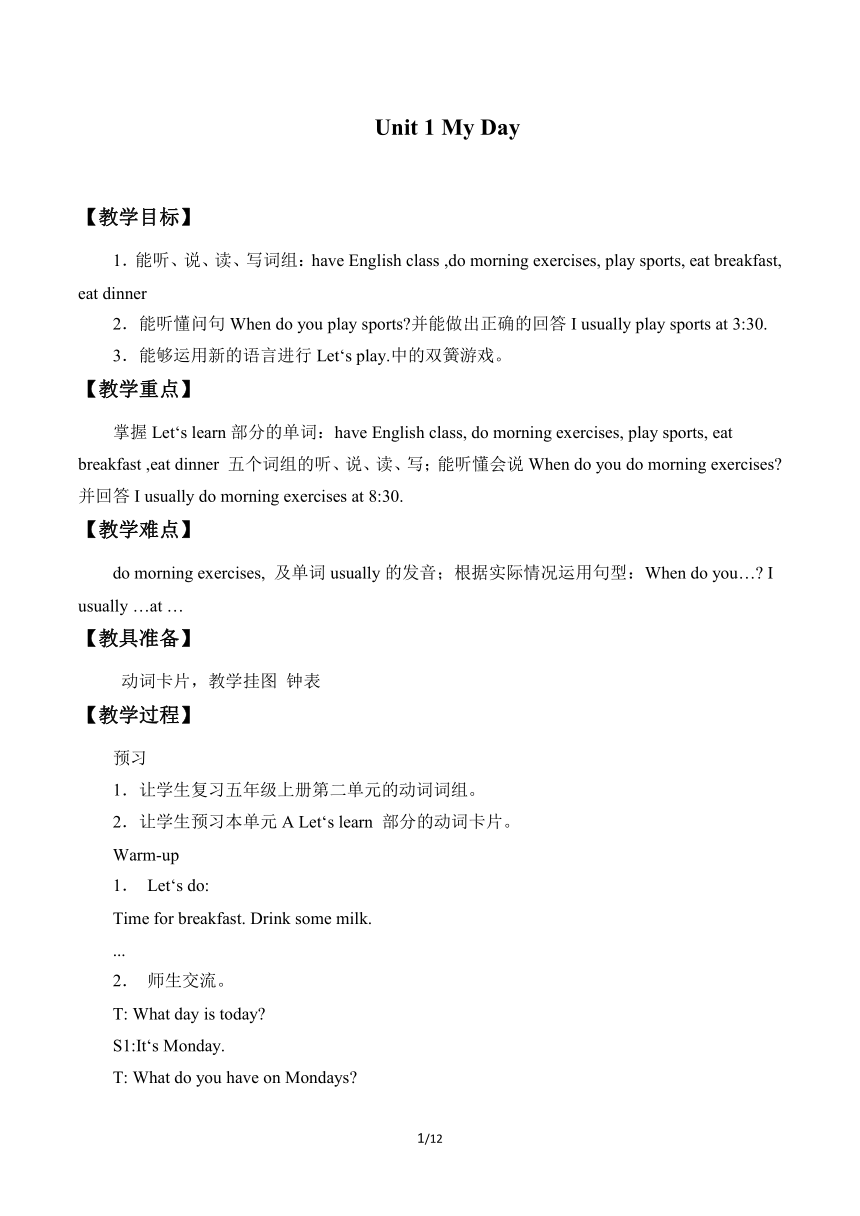 | |
| 格式 | doc | ||
| 文件大小 | 67.0KB | ||
| 资源类型 | 教案 | ||
| 版本资源 | 人教版(PEP) | ||
| 科目 | 英语 | ||
| 更新时间 | 2022-06-28 11:12:24 | ||
图片预览

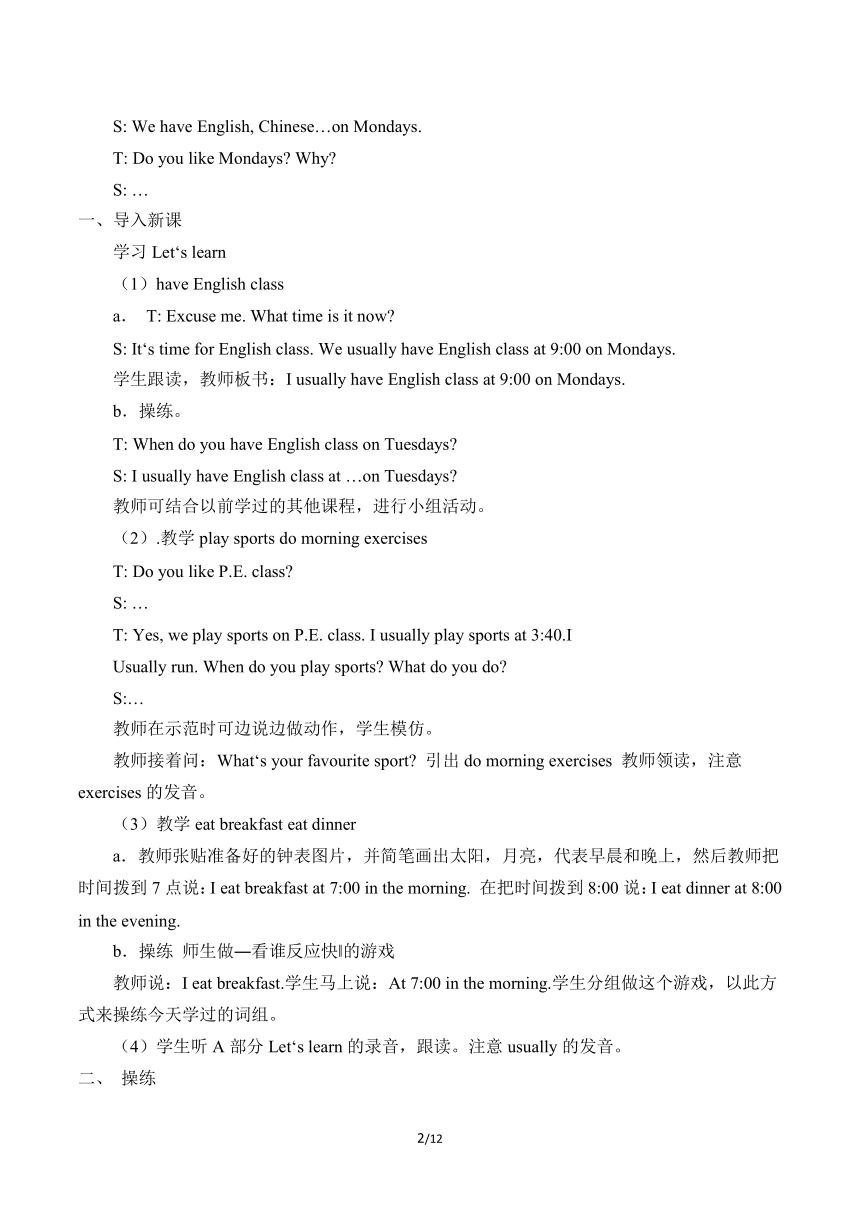
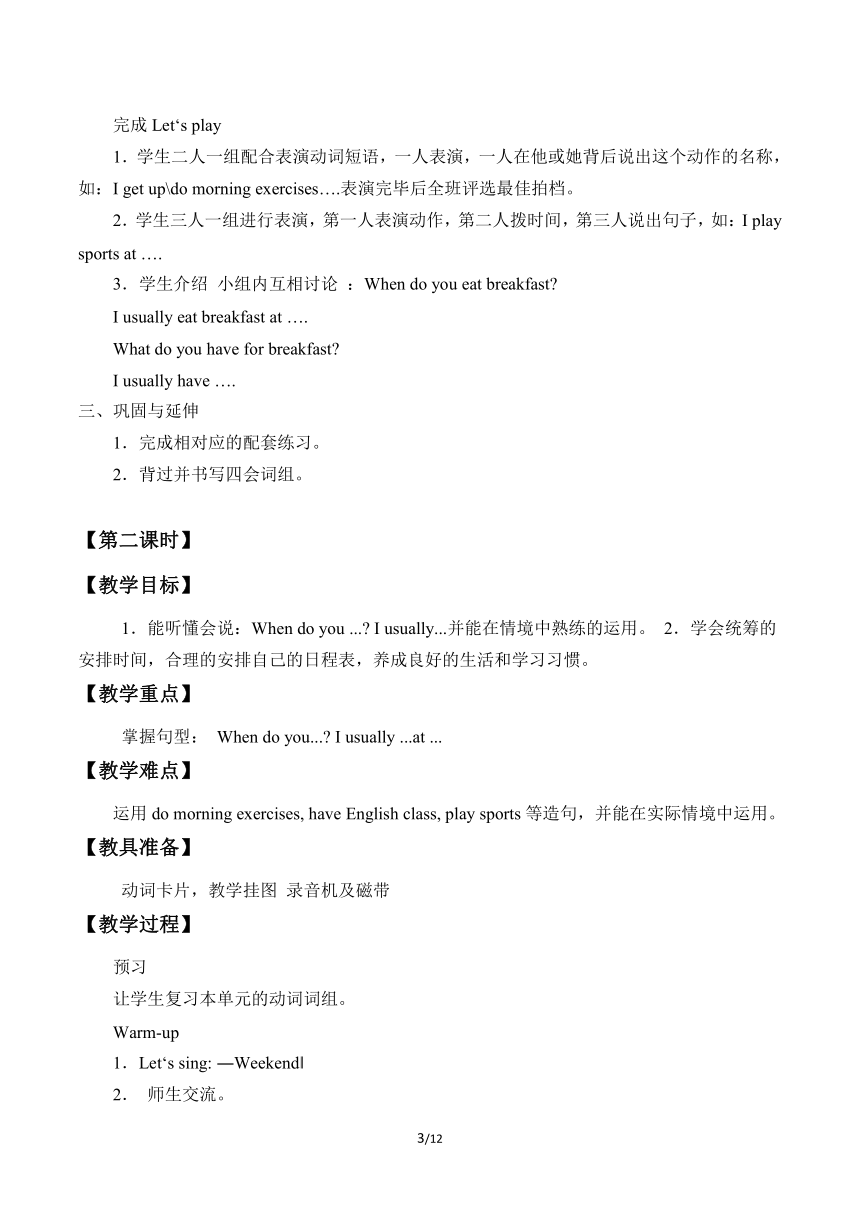
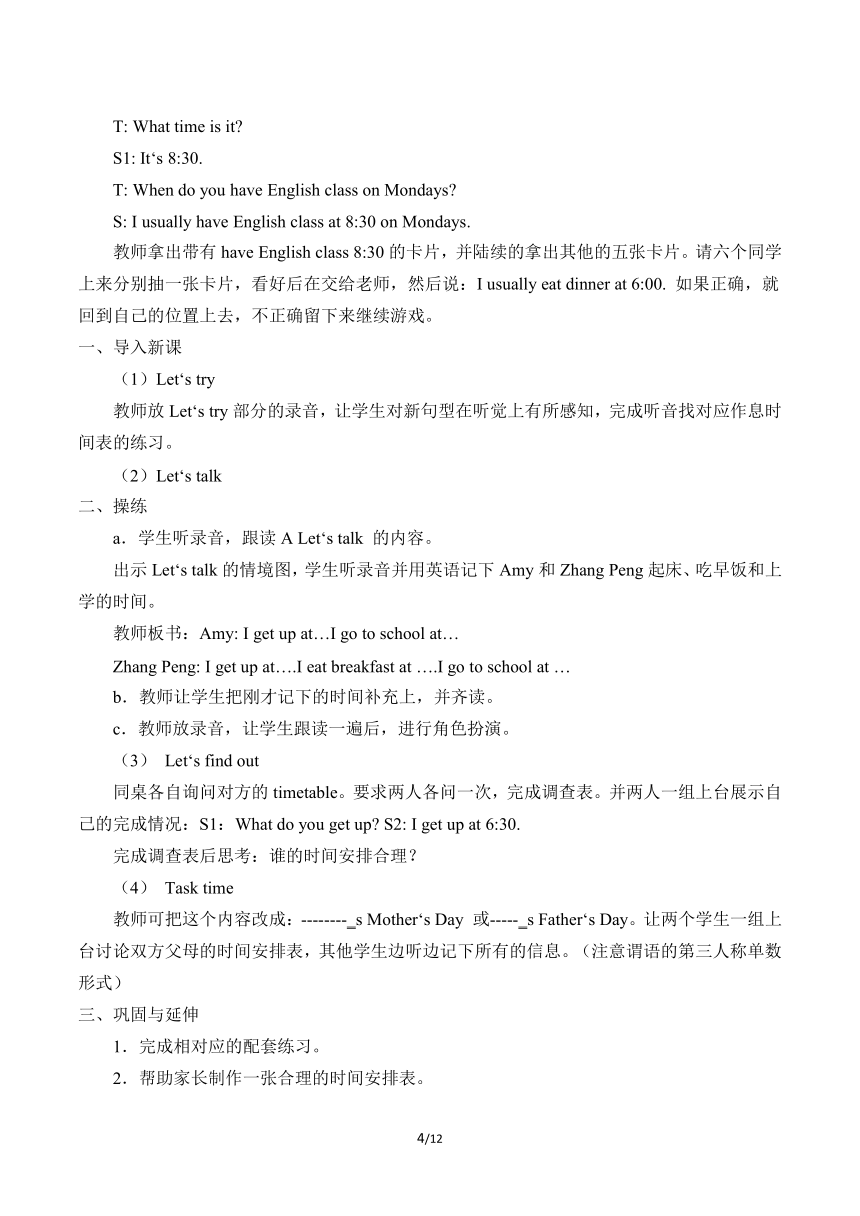
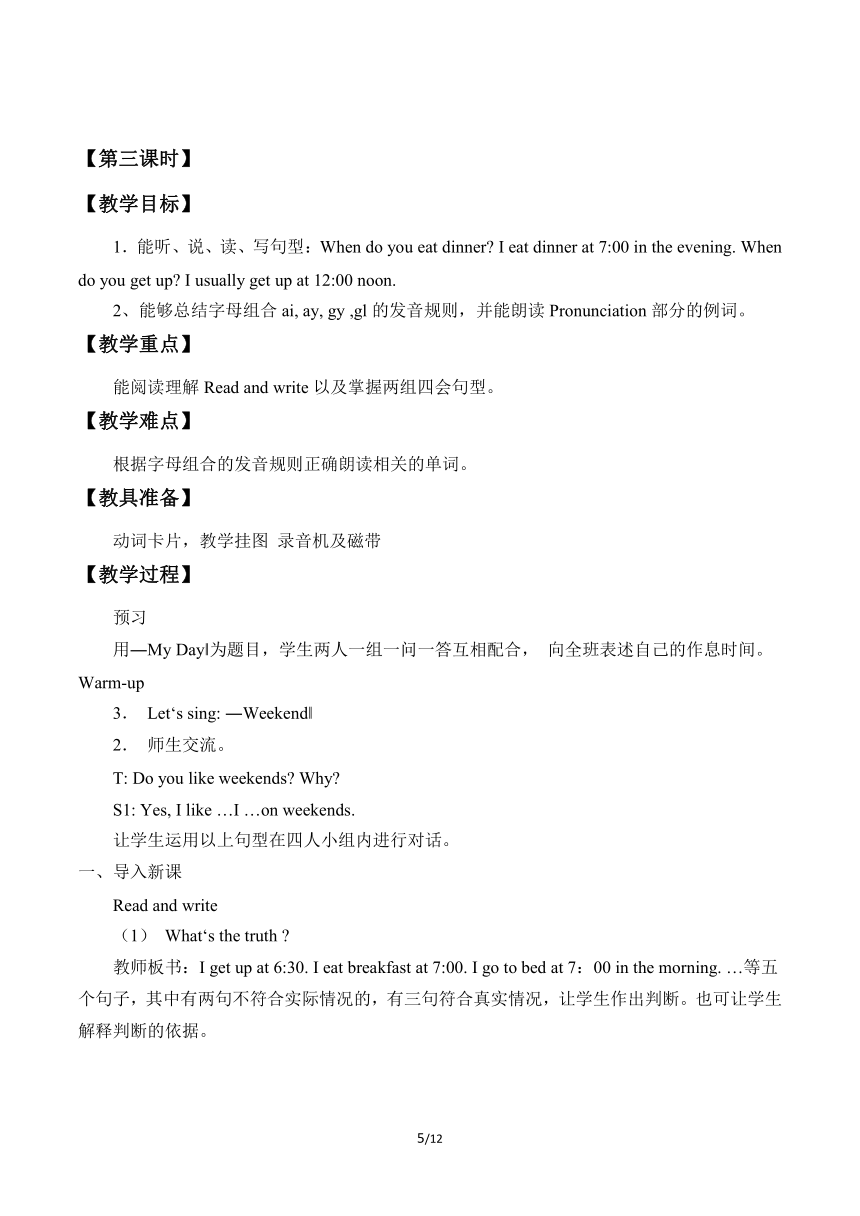
文档简介
Unit 1 My Day
【教学目标】
1.能听、说、读、写词组:have English class ,do morning exercises, play sports, eat breakfast, eat dinner
2.能听懂问句When do you play sports 并能做出正确的回答I usually play sports at 3:30.
3.能够运用新的语言进行Let‘s play.中的双簧游戏。
【教学重点】
掌握Let‘s learn部分的单词:have English class, do morning exercises, play sports, eat breakfast ,eat dinner 五个词组的听、说、读、写;能听懂会说When do you do morning exercises 并回答I usually do morning exercises at 8:30.
【教学难点】
do morning exercises, 及单词usually的发音;根据实际情况运用句型:When do you… I usually …at …
【教具准备】
动词卡片,教学挂图 钟表
【教学过程】
预习
1.让学生复习五年级上册第二单元的动词词组。
2.让学生预习本单元A Let‘s learn 部分的动词卡片。
Warm-up
1. Let‘s do:
Time for breakfast. Drink some milk.
...
2. 师生交流。
T: What day is today
S1:It‘s Monday.
T: What do you have on Mondays
S: We have English, Chinese…on Mondays.
T: Do you like Mondays Why
S: …
一、导入新课
学习Let‘s learn
(1)have English class
a. T: Excuse me. What time is it now
S: It‘s time for English class. We usually have English class at 9:00 on Mondays.
学生跟读,教师板书:I usually have English class at 9:00 on Mondays.
b.操练。
T: When do you have English class on Tuesdays
S: I usually have English class at …on Tuesdays
教师可结合以前学过的其他课程,进行小组活动。
(2).教学play sports do morning exercises
T: Do you like P.E. class
S: …
T: Yes, we play sports on P.E. class. I usually play sports at 3:40.I
Usually run. When do you play sports What do you do
S:…
教师在示范时可边说边做动作,学生模仿。
教师接着问:What‘s your favourite sport 引出do morning exercises 教师领读,注意exercises的发音。
(3)教学eat breakfast eat dinner
a.教师张贴准备好的钟表图片,并简笔画出太阳,月亮,代表早晨和晚上,然后教师把时间拨到7点说:I eat breakfast at 7:00 in the morning. 在把时间拨到8:00说:I eat dinner at 8:00 in the evening.
b.操练 师生做―看谁反应快‖的游戏
教师说:I eat breakfast.学生马上说:At 7:00 in the morning.学生分组做这个游戏,以此方式来操练今天学过的词组。
(4)学生听A部分Let‘s learn的录音,跟读。注意usually的发音。
二、 操练
完成Let‘s play
1.学生二人一组配合表演动词短语,一人表演,一人在他或她背后说出这个动作的名称,如:I get up\do morning exercises….表演完毕后全班评选最佳拍档。
2.学生三人一组进行表演,第一人表演动作,第二人拨时间,第三人说出句子,如:I play sports at ….
3.学生介绍 小组内互相讨论 :When do you eat breakfast
I usually eat breakfast at ….
What do you have for breakfast
I usually have ….
三、巩固与延伸
1.完成相对应的配套练习。
2.背过并书写四会词组。
【第二课时】
【教学目标】
1.能听懂会说:When do you ... I usually...并能在情境中熟练的运用。 2.学会统筹的安排时间,合理的安排自己的日程表,养成良好的生活和学习习惯。
【教学重点】
掌握句型: When do you... I usually ...at ...
【教学难点】
运用do morning exercises, have English class, play sports等造句,并能在实际情境中运用。
【教具准备】
动词卡片,教学挂图 录音机及磁带
【教学过程】
预习
让学生复习本单元的动词词组。
Warm-up
1.Let‘s sing: ―Weekend‖
2. 师生交流。
T: What time is it
S1: It‘s 8:30.
T: When do you have English class on Mondays
S: I usually have English class at 8:30 on Mondays.
教师拿出带有have English class 8:30的卡片,并陆续的拿出其他的五张卡片。请六个同学上来分别抽一张卡片,看好后在交给老师,然后说:I usually eat dinner at 6:00. 如果正确,就回到自己的位置上去,不正确留下来继续游戏。
一、导入新课
(1)Let‘s try
教师放Let‘s try部分的录音,让学生对新句型在听觉上有所感知,完成听音找对应作息时间表的练习。
Let‘s talk
二、操练
a.学生听录音,跟读A Let‘s talk 的内容。
出示Let‘s talk的情境图,学生听录音并用英语记下Amy和Zhang Peng起床、吃早饭和上学的时间。
教师板书:Amy: I get up at…I go to school at…
Zhang Peng: I get up at….I eat breakfast at ….I go to school at …
b.教师让学生把刚才记下的时间补充上,并齐读。
c.教师放录音,让学生跟读一遍后,进行角色扮演。
(3) Let‘s find out
同桌各自询问对方的timetable。要求两人各问一次,完成调查表。并两人一组上台展示自己的完成情况:S1:What do you get up S2: I get up at 6:30.
完成调查表后思考:谁的时间安排合理?
(4) Task time
教师可把这个内容改成:-------- s Mother‘s Day 或----- s Father‘s Day。让两个学生一组上台讨论双方父母的时间安排表,其他学生边听边记下所有的信息。(注意谓语的第三人称单数形式)
三、巩固与延伸
1.完成相对应的配套练习。
2.帮助家长制作一张合理的时间安排表。
【第三课时】
【教学目标】
1.能听、说、读、写句型:When do you eat dinner I eat dinner at 7:00 in the evening. When do you get up I usually get up at 12:00 noon.
能够总结字母组合ai, ay, gy ,gl的发音规则,并能朗读Pronunciation部分的例词。
【教学重点】
能阅读理解Read and write以及掌握两组四会句型。
【教学难点】
根据字母组合的发音规则正确朗读相关的单词。
【教具准备】
动词卡片,教学挂图 录音机及磁带
【教学过程】
预习
用―My Day‖为题目,学生两人一组一问一答互相配合, 向全班表述自己的作息时间。 Warm-up
3. Let‘s sing: ―Weekend‖
2. 师生交流。
T: Do you like weekends Why
S1: Yes, I like …I …on weekends.
让学生运用以上句型在四人小组内进行对话。
一、导入新课
Read and write
(1) What‘s the truth
教师板书:I get up at 6:30. I eat breakfast at 7:00. I go to bed at 7:00 in the morning. …等五个句子,其中有两句不符合实际情况的,有三句符合真实情况,让学生作出判断。也可让学生解释判断的依据。
(2) 活动结束时,教师说:You are right. I don‘t go to bed so late.I go to bed before 11:00.But some people really go to bed at 7:00 in the morning. Do you know why Who are they Let‘s go and see.
(3) 教师出示挂图,让学生看四张小图,分别说出他们所表示的动词短语:go to work;eat…;go to bed; play sports
(4) 带问题阅读When does the policeman go to work/go to bed/eat…/play sports 然后检查学生的理解程度。
(5) 放录音,跟读。适当解释对话中的词汇和语言,如:Can I ask you some questions Thank you for telling me about your day.
(6) 让学生完成作息时间表的练习,检查学生对对话的理解程度。
(7) 分角色练习对话。
(8) 体会文章。
T: Do you like the policeman here?Why
Pronunciation
a. play say may day today ay/ei/
b. paint wait rain rainbow ai/ei/
c. great green grow grass gr/gr/
d. glad glue glass glove gl/gl/
反复的朗读单词,练音,得出结论,应用发音特点试读简单规则词。
二、巩固与延伸
1.完成相对应的配套练习。
2.调查班中认真学习的学生的作息时间,并思考。
【第四课时】
【教学目标】
1.能听、说、读、写词组:climb mountains , go shopping ,play the piano, visit,grandparents, go hiking, 能结合所给句型:What do you do on the weekend I often...在实际情境中运用。
能理解Good to know部分的内容,并引导学生养成良好的行为习惯。
3.学唱Let‘s chant。
【教学重点】
掌握Let‘s learn部分的四会词组,并应用。
【教学难点】
词组的书写,mountains 和grandparents等较长单词的读音。
【教具准备】
动词卡片,教学挂图 录音机和磁带 照片
【教学过程】
预习
1.让学生复习五年级上册第二单元C部分Task time中制作的图书,并加以描述:I often ...on Saturdays.
Warm-up
4. Let‘s sing: 教师放C部分Let‘s sing 的录音,学生跟唱,活跃课堂气氛。 ...
一、导入新课
a.学习Let‘s learn
(1)visit grandparents
教师出示自己父母的照片,告诉学生:They are my parents. I often visit my parents on the weekend.教师领读动词visit,然后提问学生:Do you often visit your grandparents 等学生回答后,教师拿出准备好的grandparents的照片及动词卡片visit grandparents,领读该短语,然后让学生根据自己的实际情况说:I visit my uncle/aunt...on the weekend.
(2) 学习climb mountains
T: I miss my grandparents very much. But I can‘t visit my grandparents this weekend, because I‘m too busy them next weekend. We can climb mountains together.然后出示climb mountains的卡片,教师领读.
(3) 学习go hiking
教师出示go hiking 的卡片,说:We can also go hiking on the weekend .通过图片的提示理解词义,并领读。
利用同样的方式学习剩下的动词词组。
(4) 教师放本部的录音,学生跟读。
(5)呈现本部分的教学挂图,掩盖住动词短语,让学生看图进行快指快说游戏。
(6)学习Let‘s chant.
听录音理解,跟录音学唱。
二、 操练
周末乐翻天
熟悉会话What do you do on the weekend I often…
T: Then what do you do on the weekend
S: I often…
T: Do you want to know what I do on the weekend
S: What do you do on the weekend
教师悄悄的提问的学生,形成信息沟,鼓励更多的学生参与。
T:What do you do on the weekend
S:I usually play sports…
学生二人一组练习对话,并用不同的短语做替换练习。
三、巩固与延伸
1.完成相对应的配套练习。
2.背过并书写四会词组。
【第五课时】
【教学目标】
1.能听懂 、会说句型:What do you do on the weekend I often/usually play football. Sometimes I go hiking.并能在实际情境中运用。
2. 能在Let‘s find out 部分用本课目标语言云问他人周末的活动安排,从而能找到能在周末共同活动的伙伴。
3.能够听懂Let‘s try部分录音,完成听音写姓名的联系。
【教学重点】
熟练的运用句型:What do you do on the weekend I often/usually play football. Sometimes I go hiking.并能在实际情境中运用。
【教学难点】
对频度副词的使用,以及对句型―Let‘s…together next Sunday.‖的认读
【教具准备】
动词卡片,教学挂图 录音机和磁带 照片
【教学过程】
预习
1.让学生复习上一节课的动词词组,并加以描述:I often ...on Saturdays.
Warm-up
5. Let‘s chant: 教师放 的录音,学生跟唱,活跃课堂气氛。 ...
2. 师生交流。
T: I go hiking/…on the weekend.
What do you do on the weekend How many of you go hiking/…
Please put up your hands.
S: …
一、导入新课
Let‘s try
教师放录音,让学生从听觉上感知主要句型,并完成填写姓名的练习。
学习Let‘s talk
教师出示填写完整的Let‘s try部分教学挂图,请两名学生分别扮演Mike, Zhang Peng教师分别提问他们:What do you do on the weekend 两名学生根据挂图的内容进行回答。然后请两名学生互相提问他们:What do you do on the weekend 有这两名学生做相应的回答。
(2)师生互相交流,练习重点句型:
T: What do you do on the weekend 教师引导学生说:
T: I often/usually/ sometimes...
教师利用例句进一步讲解often,usually, sometimes的用法。
S: I usually have English class at …on Tuesdays
…
(3).教师放Let‘s talk部分的录音,学生跟读。然后分两组分角色朗读对话。
(4) 教师呈现挂图,让学生两人一组根据该部分替换图片所提供的信息做替换练习,鼓励学生做出更多不同的替换,形成多组对话。
Let‘s find out
(1)学生四人一组互相提问:
What do you usually do on the weekend 要提问到同组的每一个成员,找出可以一起度周末的同学,然后完成填空:I usually on the weekend. Sometimes I ___. I can ___with___. I can ___with___.
(2). 学生思考:How can you have a happy weekend 讨论最佳周末活动安排。
二、 操练
Game:新龟兔赛跑
教师请五个学生按四角的位置站立。教师喊 one ,two ,three!学生抢四角的位置,剩下一人只好站在中间,四角的学生齐问:What do you do on the weekend 中间的学生回答:I go often go hiking. 四角的学生齐答:Let‘s go hiking together next Sunday.
三、巩固与延伸
1.完成相对应的配套练习。
2.学生准备口头报告:My weekend。
【第六课时】
【教学目标】
1. 能听、说、读、写句型:What do you do on the weekend I often play football. Usually I watch TV and go shopping. Sometimes I visit my grandparents. Sometimes I go hiking.
2. 能够听、说、认读句子: The weather report says it‘s going to rain tomorrow. I can‘t play football in the rain. I can‘t go hiking, either. chant 。
【教学重点】
掌握四会句型。
【教学难点】
能根据天气来选择适合自己的活动。
【教具准备】
录音机和磁带 教学挂图
【教学过程】
预习
1.让学生复习五年级上册第二单元C部分Task time中制作的图书,并加以描述:I often ...on Saturdays.
Warm-up
1.Let‘s sing: 教师放C部分Let‘s sing 的录音,学生跟唱,活跃课堂气氛。
2.师生交流。
T: What day is today
S:…
T: What day is tomorrow
S: …
T: What day is between Friday and Monday
S: …
T: What‘s the weather like today/tomorrow
S:…
一、导入新课
Read and write
(1) 教师出示本部分的挂图,引导学生仔细观察五福配图,是介绍:These are Zip‘s weekend activities. Those are Zoom‘s weekend activities. Look at the pictures carefully.然后提问:What can you do on the weekend 引导学生看图回答:Zip can... Zoom can...
(2) 让学生自主阅读本部分的对话,找出不理解的生词和句子,师生或生生之间共同商讨解决问题。
(3)理解句子:The weather report says it‘s going to rain tomorrow. I can‘t ...I can‘t...either. Let‘s watch TV together.
教师请一名学生报告明天的天气情况:―Good morning. It‘s fine today. But it‘s going to rain tomorrow.‖然后教师与另一名学生展开对话:
T:What do you do on the weekend
S: I usually play football. Sometimes I....
T: The weather report says it‘s going to rain tomorrow.
S: Oh, dear! I can‘t....I can‘t....either.
T: Let‘s ....
S: OK.
(4) 教师放Read and write 部分的录音,学生跟读。
(5)选几组学生表演对话。
(6)完成对话后的表格,并书写四会掌握的句子。
Let‘s check
教师放录音,学生完成填充作息时间表和选择周末活动两项练
二、操练
学生做传递问题的游戏,同一排学生为一组:
A:What do you do on the weekend
B:I often go shopping. What do you do on the weekend
C: I usually....
三、巩固与延伸
1.完成相对应的配套练习。
2.背过并书写四会句型。
3.用简单的句子描述自己在晴、雨天不同的活动。
【教学目标】
1.能听、说、读、写词组:have English class ,do morning exercises, play sports, eat breakfast, eat dinner
2.能听懂问句When do you play sports 并能做出正确的回答I usually play sports at 3:30.
3.能够运用新的语言进行Let‘s play.中的双簧游戏。
【教学重点】
掌握Let‘s learn部分的单词:have English class, do morning exercises, play sports, eat breakfast ,eat dinner 五个词组的听、说、读、写;能听懂会说When do you do morning exercises 并回答I usually do morning exercises at 8:30.
【教学难点】
do morning exercises, 及单词usually的发音;根据实际情况运用句型:When do you… I usually …at …
【教具准备】
动词卡片,教学挂图 钟表
【教学过程】
预习
1.让学生复习五年级上册第二单元的动词词组。
2.让学生预习本单元A Let‘s learn 部分的动词卡片。
Warm-up
1. Let‘s do:
Time for breakfast. Drink some milk.
...
2. 师生交流。
T: What day is today
S1:It‘s Monday.
T: What do you have on Mondays
S: We have English, Chinese…on Mondays.
T: Do you like Mondays Why
S: …
一、导入新课
学习Let‘s learn
(1)have English class
a. T: Excuse me. What time is it now
S: It‘s time for English class. We usually have English class at 9:00 on Mondays.
学生跟读,教师板书:I usually have English class at 9:00 on Mondays.
b.操练。
T: When do you have English class on Tuesdays
S: I usually have English class at …on Tuesdays
教师可结合以前学过的其他课程,进行小组活动。
(2).教学play sports do morning exercises
T: Do you like P.E. class
S: …
T: Yes, we play sports on P.E. class. I usually play sports at 3:40.I
Usually run. When do you play sports What do you do
S:…
教师在示范时可边说边做动作,学生模仿。
教师接着问:What‘s your favourite sport 引出do morning exercises 教师领读,注意exercises的发音。
(3)教学eat breakfast eat dinner
a.教师张贴准备好的钟表图片,并简笔画出太阳,月亮,代表早晨和晚上,然后教师把时间拨到7点说:I eat breakfast at 7:00 in the morning. 在把时间拨到8:00说:I eat dinner at 8:00 in the evening.
b.操练 师生做―看谁反应快‖的游戏
教师说:I eat breakfast.学生马上说:At 7:00 in the morning.学生分组做这个游戏,以此方式来操练今天学过的词组。
(4)学生听A部分Let‘s learn的录音,跟读。注意usually的发音。
二、 操练
完成Let‘s play
1.学生二人一组配合表演动词短语,一人表演,一人在他或她背后说出这个动作的名称,如:I get up\do morning exercises….表演完毕后全班评选最佳拍档。
2.学生三人一组进行表演,第一人表演动作,第二人拨时间,第三人说出句子,如:I play sports at ….
3.学生介绍 小组内互相讨论 :When do you eat breakfast
I usually eat breakfast at ….
What do you have for breakfast
I usually have ….
三、巩固与延伸
1.完成相对应的配套练习。
2.背过并书写四会词组。
【第二课时】
【教学目标】
1.能听懂会说:When do you ... I usually...并能在情境中熟练的运用。 2.学会统筹的安排时间,合理的安排自己的日程表,养成良好的生活和学习习惯。
【教学重点】
掌握句型: When do you... I usually ...at ...
【教学难点】
运用do morning exercises, have English class, play sports等造句,并能在实际情境中运用。
【教具准备】
动词卡片,教学挂图 录音机及磁带
【教学过程】
预习
让学生复习本单元的动词词组。
Warm-up
1.Let‘s sing: ―Weekend‖
2. 师生交流。
T: What time is it
S1: It‘s 8:30.
T: When do you have English class on Mondays
S: I usually have English class at 8:30 on Mondays.
教师拿出带有have English class 8:30的卡片,并陆续的拿出其他的五张卡片。请六个同学上来分别抽一张卡片,看好后在交给老师,然后说:I usually eat dinner at 6:00. 如果正确,就回到自己的位置上去,不正确留下来继续游戏。
一、导入新课
(1)Let‘s try
教师放Let‘s try部分的录音,让学生对新句型在听觉上有所感知,完成听音找对应作息时间表的练习。
Let‘s talk
二、操练
a.学生听录音,跟读A Let‘s talk 的内容。
出示Let‘s talk的情境图,学生听录音并用英语记下Amy和Zhang Peng起床、吃早饭和上学的时间。
教师板书:Amy: I get up at…I go to school at…
Zhang Peng: I get up at….I eat breakfast at ….I go to school at …
b.教师让学生把刚才记下的时间补充上,并齐读。
c.教师放录音,让学生跟读一遍后,进行角色扮演。
(3) Let‘s find out
同桌各自询问对方的timetable。要求两人各问一次,完成调查表。并两人一组上台展示自己的完成情况:S1:What do you get up S2: I get up at 6:30.
完成调查表后思考:谁的时间安排合理?
(4) Task time
教师可把这个内容改成:-------- s Mother‘s Day 或----- s Father‘s Day。让两个学生一组上台讨论双方父母的时间安排表,其他学生边听边记下所有的信息。(注意谓语的第三人称单数形式)
三、巩固与延伸
1.完成相对应的配套练习。
2.帮助家长制作一张合理的时间安排表。
【第三课时】
【教学目标】
1.能听、说、读、写句型:When do you eat dinner I eat dinner at 7:00 in the evening. When do you get up I usually get up at 12:00 noon.
能够总结字母组合ai, ay, gy ,gl的发音规则,并能朗读Pronunciation部分的例词。
【教学重点】
能阅读理解Read and write以及掌握两组四会句型。
【教学难点】
根据字母组合的发音规则正确朗读相关的单词。
【教具准备】
动词卡片,教学挂图 录音机及磁带
【教学过程】
预习
用―My Day‖为题目,学生两人一组一问一答互相配合, 向全班表述自己的作息时间。 Warm-up
3. Let‘s sing: ―Weekend‖
2. 师生交流。
T: Do you like weekends Why
S1: Yes, I like …I …on weekends.
让学生运用以上句型在四人小组内进行对话。
一、导入新课
Read and write
(1) What‘s the truth
教师板书:I get up at 6:30. I eat breakfast at 7:00. I go to bed at 7:00 in the morning. …等五个句子,其中有两句不符合实际情况的,有三句符合真实情况,让学生作出判断。也可让学生解释判断的依据。
(2) 活动结束时,教师说:You are right. I don‘t go to bed so late.I go to bed before 11:00.But some people really go to bed at 7:00 in the morning. Do you know why Who are they Let‘s go and see.
(3) 教师出示挂图,让学生看四张小图,分别说出他们所表示的动词短语:go to work;eat…;go to bed; play sports
(4) 带问题阅读When does the policeman go to work/go to bed/eat…/play sports 然后检查学生的理解程度。
(5) 放录音,跟读。适当解释对话中的词汇和语言,如:Can I ask you some questions Thank you for telling me about your day.
(6) 让学生完成作息时间表的练习,检查学生对对话的理解程度。
(7) 分角色练习对话。
(8) 体会文章。
T: Do you like the policeman here?Why
Pronunciation
a. play say may day today ay/ei/
b. paint wait rain rainbow ai/ei/
c. great green grow grass gr/gr/
d. glad glue glass glove gl/gl/
反复的朗读单词,练音,得出结论,应用发音特点试读简单规则词。
二、巩固与延伸
1.完成相对应的配套练习。
2.调查班中认真学习的学生的作息时间,并思考。
【第四课时】
【教学目标】
1.能听、说、读、写词组:climb mountains , go shopping ,play the piano, visit,grandparents, go hiking, 能结合所给句型:What do you do on the weekend I often...在实际情境中运用。
能理解Good to know部分的内容,并引导学生养成良好的行为习惯。
3.学唱Let‘s chant。
【教学重点】
掌握Let‘s learn部分的四会词组,并应用。
【教学难点】
词组的书写,mountains 和grandparents等较长单词的读音。
【教具准备】
动词卡片,教学挂图 录音机和磁带 照片
【教学过程】
预习
1.让学生复习五年级上册第二单元C部分Task time中制作的图书,并加以描述:I often ...on Saturdays.
Warm-up
4. Let‘s sing: 教师放C部分Let‘s sing 的录音,学生跟唱,活跃课堂气氛。 ...
一、导入新课
a.学习Let‘s learn
(1)visit grandparents
教师出示自己父母的照片,告诉学生:They are my parents. I often visit my parents on the weekend.教师领读动词visit,然后提问学生:Do you often visit your grandparents 等学生回答后,教师拿出准备好的grandparents的照片及动词卡片visit grandparents,领读该短语,然后让学生根据自己的实际情况说:I visit my uncle/aunt...on the weekend.
(2) 学习climb mountains
T: I miss my grandparents very much. But I can‘t visit my grandparents this weekend, because I‘m too busy them next weekend. We can climb mountains together.然后出示climb mountains的卡片,教师领读.
(3) 学习go hiking
教师出示go hiking 的卡片,说:We can also go hiking on the weekend .通过图片的提示理解词义,并领读。
利用同样的方式学习剩下的动词词组。
(4) 教师放本部的录音,学生跟读。
(5)呈现本部分的教学挂图,掩盖住动词短语,让学生看图进行快指快说游戏。
(6)学习Let‘s chant.
听录音理解,跟录音学唱。
二、 操练
周末乐翻天
熟悉会话What do you do on the weekend I often…
T: Then what do you do on the weekend
S: I often…
T: Do you want to know what I do on the weekend
S: What do you do on the weekend
教师悄悄的提问的学生,形成信息沟,鼓励更多的学生参与。
T:What do you do on the weekend
S:I usually play sports…
学生二人一组练习对话,并用不同的短语做替换练习。
三、巩固与延伸
1.完成相对应的配套练习。
2.背过并书写四会词组。
【第五课时】
【教学目标】
1.能听懂 、会说句型:What do you do on the weekend I often/usually play football. Sometimes I go hiking.并能在实际情境中运用。
2. 能在Let‘s find out 部分用本课目标语言云问他人周末的活动安排,从而能找到能在周末共同活动的伙伴。
3.能够听懂Let‘s try部分录音,完成听音写姓名的联系。
【教学重点】
熟练的运用句型:What do you do on the weekend I often/usually play football. Sometimes I go hiking.并能在实际情境中运用。
【教学难点】
对频度副词的使用,以及对句型―Let‘s…together next Sunday.‖的认读
【教具准备】
动词卡片,教学挂图 录音机和磁带 照片
【教学过程】
预习
1.让学生复习上一节课的动词词组,并加以描述:I often ...on Saturdays.
Warm-up
5. Let‘s chant: 教师放 的录音,学生跟唱,活跃课堂气氛。 ...
2. 师生交流。
T: I go hiking/…on the weekend.
What do you do on the weekend How many of you go hiking/…
Please put up your hands.
S: …
一、导入新课
Let‘s try
教师放录音,让学生从听觉上感知主要句型,并完成填写姓名的练习。
学习Let‘s talk
教师出示填写完整的Let‘s try部分教学挂图,请两名学生分别扮演Mike, Zhang Peng教师分别提问他们:What do you do on the weekend 两名学生根据挂图的内容进行回答。然后请两名学生互相提问他们:What do you do on the weekend 有这两名学生做相应的回答。
(2)师生互相交流,练习重点句型:
T: What do you do on the weekend 教师引导学生说:
T: I often/usually/ sometimes...
教师利用例句进一步讲解often,usually, sometimes的用法。
S: I usually have English class at …on Tuesdays
…
(3).教师放Let‘s talk部分的录音,学生跟读。然后分两组分角色朗读对话。
(4) 教师呈现挂图,让学生两人一组根据该部分替换图片所提供的信息做替换练习,鼓励学生做出更多不同的替换,形成多组对话。
Let‘s find out
(1)学生四人一组互相提问:
What do you usually do on the weekend 要提问到同组的每一个成员,找出可以一起度周末的同学,然后完成填空:I usually on the weekend. Sometimes I ___. I can ___with___. I can ___with___.
(2). 学生思考:How can you have a happy weekend 讨论最佳周末活动安排。
二、 操练
Game:新龟兔赛跑
教师请五个学生按四角的位置站立。教师喊 one ,two ,three!学生抢四角的位置,剩下一人只好站在中间,四角的学生齐问:What do you do on the weekend 中间的学生回答:I go often go hiking. 四角的学生齐答:Let‘s go hiking together next Sunday.
三、巩固与延伸
1.完成相对应的配套练习。
2.学生准备口头报告:My weekend。
【第六课时】
【教学目标】
1. 能听、说、读、写句型:What do you do on the weekend I often play football. Usually I watch TV and go shopping. Sometimes I visit my grandparents. Sometimes I go hiking.
2. 能够听、说、认读句子: The weather report says it‘s going to rain tomorrow. I can‘t play football in the rain. I can‘t go hiking, either. chant 。
【教学重点】
掌握四会句型。
【教学难点】
能根据天气来选择适合自己的活动。
【教具准备】
录音机和磁带 教学挂图
【教学过程】
预习
1.让学生复习五年级上册第二单元C部分Task time中制作的图书,并加以描述:I often ...on Saturdays.
Warm-up
1.Let‘s sing: 教师放C部分Let‘s sing 的录音,学生跟唱,活跃课堂气氛。
2.师生交流。
T: What day is today
S:…
T: What day is tomorrow
S: …
T: What day is between Friday and Monday
S: …
T: What‘s the weather like today/tomorrow
S:…
一、导入新课
Read and write
(1) 教师出示本部分的挂图,引导学生仔细观察五福配图,是介绍:These are Zip‘s weekend activities. Those are Zoom‘s weekend activities. Look at the pictures carefully.然后提问:What can you do on the weekend 引导学生看图回答:Zip can... Zoom can...
(2) 让学生自主阅读本部分的对话,找出不理解的生词和句子,师生或生生之间共同商讨解决问题。
(3)理解句子:The weather report says it‘s going to rain tomorrow. I can‘t ...I can‘t...either. Let‘s watch TV together.
教师请一名学生报告明天的天气情况:―Good morning. It‘s fine today. But it‘s going to rain tomorrow.‖然后教师与另一名学生展开对话:
T:What do you do on the weekend
S: I usually play football. Sometimes I....
T: The weather report says it‘s going to rain tomorrow.
S: Oh, dear! I can‘t....I can‘t....either.
T: Let‘s ....
S: OK.
(4) 教师放Read and write 部分的录音,学生跟读。
(5)选几组学生表演对话。
(6)完成对话后的表格,并书写四会掌握的句子。
Let‘s check
教师放录音,学生完成填充作息时间表和选择周末活动两项练
二、操练
学生做传递问题的游戏,同一排学生为一组:
A:What do you do on the weekend
B:I often go shopping. What do you do on the weekend
C: I usually....
三、巩固与延伸
1.完成相对应的配套练习。
2.背过并书写四会句型。
3.用简单的句子描述自己在晴、雨天不同的活动。
